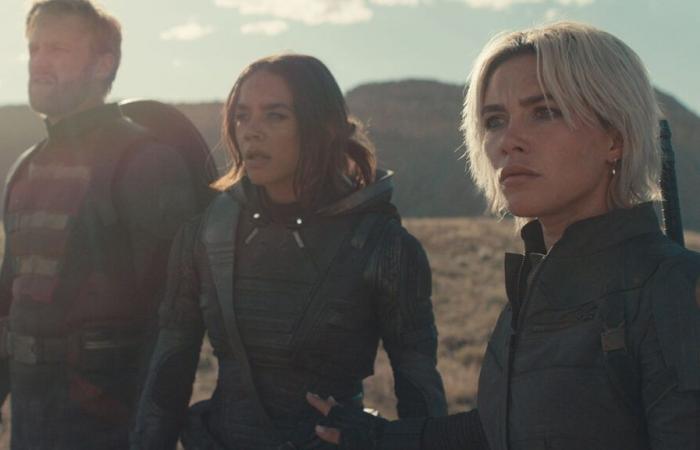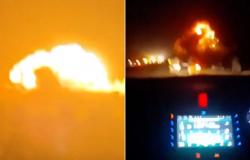[This story contains spoilers for Thunderbolts*]
Director Jake Screen’s Thunderbolts* caught many audiences by surprise this weekend. Not only in terms of what’s behind the name, which I’ll get to, but its lack of conventionality. The Marvel Studios movie proved to be a hit with critics who have been less forgiving of certain Marvel-isms of late. The positive reception feels like a legitimate game-changer for the MCU going forward. And not in the conventional way of box office records or audiences doing flips and screaming themselves hoarse in theaters. It’s a quieter, more profound and arguably more important kind of game-changer that once again shows that Marvel Studios is at its best when it leans on underdogs and defies expectations.
The cycle of proclamations claiming, “Marvel is over!” followed by, “Marvel is back!” has grown tiresome because neither is true. Marvel is simply here, a constant that, like all long-running franchises, and like the comics it’s based on, has its highs and lows. For the Marvel Cinematic Universe, this has been the case since 2008 when Iron Man soared, and The Incredible Hulkcentered on a more recognizable and beloved character at the time, was met with a shrug. Reactions to the subsequent entries moved up and down the chart from there. Much of this comes down to expectation and what we believe these films will be or should be, spurred on by “scoopers” feeding the rumor mills with falsehood. But every so often, one of these MCU films comes around and shakes us out of our expectations and desire to have them fulfilled just as we imagined, or as the comics have foretold.
The reveal of the Thunderbolts’ real name at the end of the movie, The new Avengers, brings back a sense of camaraderie that the MCU has been missing, as all of its heroes have been pulled in different directions in the aftermath of Avengers: Endgame. It doesn’t matter that the team is not the same lineup as the one first introduced in the comics. Rather, the importance is that it shakes up the status quo and throws a wrinkle in Captain America’s (Anthony Mackie) own assembly of Avengers, making Avengers: Doomsday feel more exciting and less predictable. Much like Brian Michael Bendis and David Finch’s comic series, The New Avengers (2004), formed after the decimation of the Avengers, this team feels exciting because it’s not necessarily what fans were asking for.
Though it’s now considered a highlight in Marvel Comics history, The New Avengers also surprised and left many fans scratching their heads at the lineup. While the team did include mainstays like Captain America and Iron Man (until Civil War), it also included Luke Cage, Spider-Woman, Echo, Spider-Man, Wolverine and Sentry. While Wolverine and Spider-Man are two of Marvel’s most popular characters, Wolverine’s association with the X-Men and Spider-Man’s reputation for being a solo hero made them odd inclusions.
Spider-Woman hadn’t appeared in much more than minor roles since the late ’80s. Luke Cage was then best known as a costume-less supporting character in Bendis’ Marvel Max series Aliasled by Jessica Jones. Echo, under the guise of Ronin, was an infrequently appearing Daredevil character. And Sentry hadn’t been used in nearly four years, his story largely self-contained and seemingly complete. This wasn’t an Avengers team readers were familiar with, and as such, it allowed Bendis to play with expectations, define the voices of infrequently used characters, darken the doorstep of Earth’s Mightiest Heroes and usher in one of Marvel Comics’ most exciting eras. As much as Marvel Studios is guided by fan response, a strong enough vision makes a strong case for giving audiences not what they want, but what the narrative needs.
When Marvel’s Thunderbolts* was first announced in 2022, many fans met the news with plenty of reservations. Director Jake Schreier hadn’t made a name for himself with Beef (2023) yet, and if he was known at all, it was for his adaptation of John Green’s YA novel, Paper Towns (2015), the indie science fiction dramedy Robot & Frank (2012) and various TV work. There was no expectation that he would turn out to be a visionary filmmaker, and he seemed like just another example of Marvel Studios choosing allegedly inexpensive directors who weren’t ready to leap into the world of giant VFX battles while juggling a multitude of unique characters.
There was grumbling over the roster featuring characters deemed too similar to each other, and lacking heavy hitters like Red Hulk, Deadpool, Punisher, Songbird, Atlas, Moonstone and various other characters who have been members through the team’s numerous iterations. And most of all, there was a befuddlement over the lack of Daniel Bruhl’s Baron Zemo, who in the comics was the creator and leader of the Thunderbolts. Although Zemo’s entire mission in the MCU has been to rid the world of superpowered individuals, and it wouldn’t track with his characterization for him to make and lead a team of them, there was concern that Thunderbolts* was merely that in name only. Instead of something aligned with the comics, fans feared that what they would be getting instead was some kind of … suicide squad.
-Funny enough, and what feels like a clever move on Schreier and writers Eric Pearson and Joanna Calo’s part, Thunderbolts* is a kind of suicide squad. Though unlike DC’s Task Force X, the reluctant team, consisting of former Red Room assassin Yelena Belova (Florence Pugh), terrorist-turned-superhero-turned-congressman Bucky Barnes (Sebastian Stan), former Russian super-soldier discarded by his country Red Guardian (David Harbour), disgraced ex-Captain America John Walker (Wyatt Russell), a victim of a childhood lab accident and abused SHIELD operative Ghost (Hannah John-Kamen), and manic depressive former meth addict given an experimental serum Bob (Lewis Pullman), aren’t at the mercy of being physically controlled by outside forces who placed bombs in their necks. Instead, these individuals are bound by unique cases of mental illness, depression and suicidal ideation.
At the start of the film, there’s an overwhelming sense that none of these characters is long for this world, and the early execution of Taskmaster (Olga Kurylenko) highlights that. The end of Black Widow (2021) gave her a new lease on life, with Natasha (Scarlett Johansson) emphasizing to the freed Widows that she’s been through more than any of them and to take care of her. Despite that, it’s obvious that once freed from her programming, she continued to work as an assassin because that’s all she knew. And as Yelena tells Ghost, she did a lot of bad things and was killed by someone else doing bad things, a fate that awaits them all. What works in terms of Taskmaster’s death is that it’s not a source of levity (à la Sabretooth in Deadpool & Wolverine), or a means to cause pain to another character (Maria Hill’s death in Secret Invasion), but a means to simply reckon with the lives they’ve chosen and their seeming lack of potential for anything more.
It’s surprising to see an MCU film deal with these issues in a way that resonates and feels honest to each character. Yes, we’ve seen grief given its share of examination, and Phase 4 in particular revolves around grief. And the MCU isn’t lacking in psychological examinations, with Black Panther (2018), WandaVision (2021) and Loki (2021) being key examples. But Thunderbolts* is sharper edged than what’s come before. The film forces the characters to contend with their shame, lack of belief systems and misguided morals. The easy route would be to build the movie around who will die and how. The announcement of the Thunderbolts* actors reprising their roles in Avengers: Doomsday was accused of spoiling the fate of the characters and taking away the thrilling threat of death. But Thunderbolts* isn’t built on body count, and how the characters die, but how they can survive when survival hangs low on their list of priorities.
The void, a perpetual emptiness, is something they all feel and is later given physical form when Bob is made into Sentry, and his secondary personality, the Void, is unleashed across New York City. But the manifestation of the void in an individual sense varies from Yelena trying to push down all of the bad things she’s done by drowning the memories out with alcohol to John Walker pushing away his wife and child and his feelings of inadequacy leading to overcompensation. There’s a specificity to what each character is dealing with, and while the movie is often quite funny, it never diminishes the weight of what these characters are dealing with individually and together.
Of course, in terms of psychological insight, the film can’t be all things for all audiences. Some critics rankled against the film’s solution, in which depression and ideation are something that can’t be beaten, only lived with, yet made easier to carry by allowing others to help with the weight of it. Thunderbolts* isn’t a personal therapy session, but a movie made for mass audiences. But the ability to balance the deeper and darker considerations of mental illness, alongside delivering a highly entertaining superhero movie, emboldens the MCU and takes it outside the realm of comfort.
Claiming Thunderbolts* is outside the realm of comfort may sound ironic because the Void is ultimately held back by a group hug and these characters’ ability to find comfort in each other. But for a franchise that frequently sees its villains meet their ends by physical prowess, MacGuffins, and the destruction of sky beams and falling towers, Thunderbolts* does shake the MCU out of its comfort zone.
It energizes the MCU in a way that feels comparable to Guardians of the Galaxy (2014), in which we have a group of misfits who aren’t moral bastions, or overwhelmingly intelligent, but are so clearly defined in terms of their flaws that it’s hard not to root for them. Where Guardians of the Galaxy centered on found family, and also saw its antagonist defeated by the unconventional means of a dance party, Thunderbolts* comes into focus as a team of found friends.
This already sets them apart from the Avengers, who were co-workers with friendly relationships (most of the time) but felt like they could handle things on their own when the time came. But the codependent nature of these individuals has a lot of potential going forward. These aren’t the New Avengers fans asked for, but they are the most exciting team to emerge from the MCU in over a decade. Hopefully, these New Avengers continue to defy the expectations of fans and fill a void in the MCU that’s been missing a group of underdogs.








